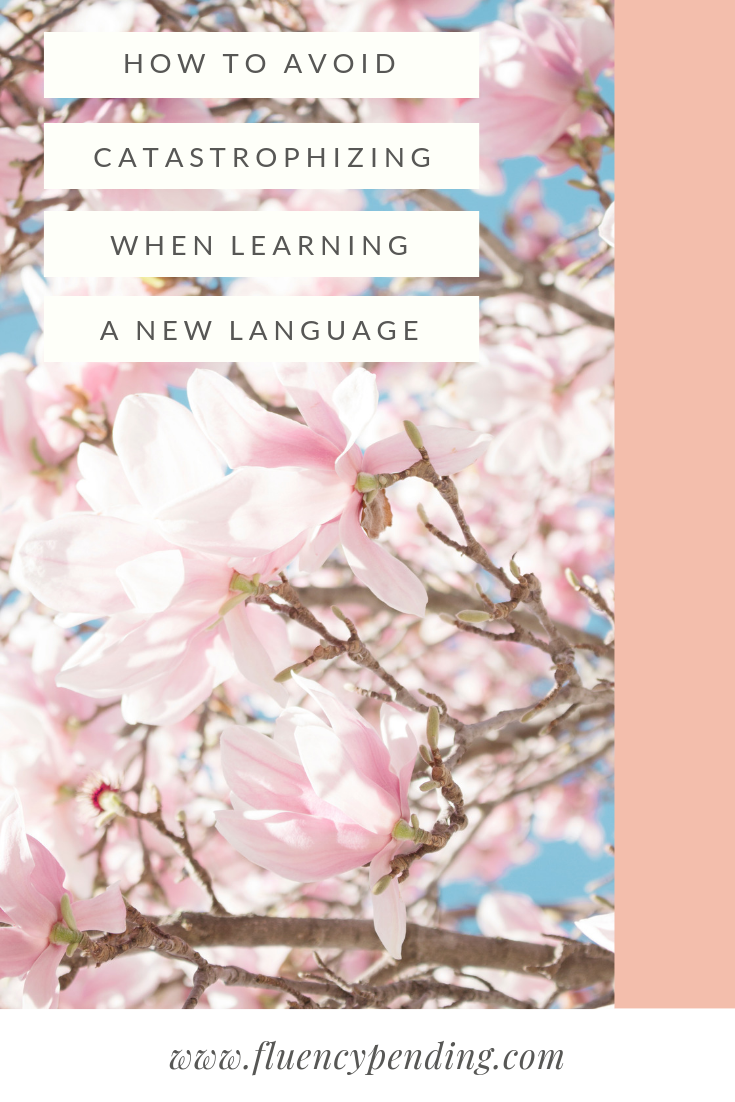
On Catastrophizing in Language Learning
Please keep in mind that some of the links in this post are affiliate links. In the event of a sale, I will be awarded a small commission (at no extra cost for you). Thank you for supporting my blog!
Are you guilty of catastrophizing in language learning? I’ll put my hand up. I am the queen of catastrophizing, often going from 0 to worst-case scenario in record speed.
By ‘catastrophizing’ I mean the tendency to view a situation as considerably worse than it actually is. In language learning, this can be a particularly nasty habit, crippling your self-confidence and standing in the way of progress. At worst, it can lead to giving up altogether.
Here are two ‘catastrophes’ that my brain conjured up recently while trying to get to grips with Mandarin.
Catastrophe 1
I am terrible at tones. Nobody will ever be able to understand me. I might as well give up now.
The truth
In fact, I don’t have a problem with tones. I have a problem with the third tone and, when faced with a large chunk of text, tone pairs.
Once the initial panic of this catastrophic thinking wore off, I started digging into some resources to help me with my supposed tone deafness. I stumbled across this video by Yoyo Chinese and it was like a lightbulb moment for me. Turns out, I struggle with the third tone because it was taught as an exaggerated falling and rising tone in my university class. Who knew there was something called a half third tone! Now that I’ve pinpointed the problem, I am no longer repeating the same bad habit and can start to make progress.
As for not being able to recite long passages with perfect intonation, I can live with slowly improving this through listening and some practice drilling tone pairs. Unless you’re a villain in a TV drama, you’re very rarely required to launch into a lengthy monologue anyway.
Catastrophe 2
Look at this giant list of characters I have to cram into my brain. I am too old/not clever enough to remember all these characters. I’m practically illiterate. I might as well give up now.
The truth
Nice one, brain. This is just blatantly untrue. I’m perfectly capable of remembering Hanzi. If I weren’t, I would still be stuck on that HSK 1 vocab list, right?
Actually, I was doing quite well by slowly building up my vocabulary until I started doing some math (never a good idea for me). I started adding up all of the words I’ve saved in various categories in my Pleco app. It was a whopping 15 000 words. I panicked. Of course I panicked. Suddenly I was faced with an insurmountable mountain of words to cram.
What my irrational reptilian brain didn’t take into account was that a large number of these words are known words or at least words that are hanging out in my passive vocabulary (ones I can recognise when reading but I’m not quite ready to put into rotation in speaking and writing).
The crisis wasn’t quite as dire as I’d first imagined, but this moment of panic did serve to highlight a couple of problems with my approach to learning vocabulary:
- I needed a better way to organise my vocabulary lists so I can easily distinguish between known, unknown, problematic and for review words. I solved this problem by creating subcategories within my Pleco app to keep track of it all.
- With nearly 15 000 non-HSK words encountered in the wild, I still have large gaps in understanding when reading novels or watching television. One of my long-term goals is to be able to consume native material without constant help from the dictionary. The problem is that I seem to be amassing new words (mostly through reading) faster than I can learn them. I’ve put a pause on intensive reading for now and I’m focussing on building a schedule for cementing recall for the words already in my vocabulary lists.
What I’ve learned
When focusing on the specific issue, rather than allowing yourself to become overwhelmed by a general sense of disaster, the problem becomes much more manageable.
What you can do to curb the catastrophe
- Acknowledge the catastrophe. At risk of channeling Dr Phil here, it’s perfectly normal to have moments of panic or negativity. Often the panic can actually point us in the right direction and serve as a motivator for improvement. Allow yourself to feel the catastrophe, then take a step back and use it as an impetus for action.
- Facts first. How much of your initial gut response is actually true? Can you separate fact from panic-induced fiction and pinpoint the real issue?
- Action plan. Now that you’ve identified the real problem, what are you going to do about it? Map out a course of action. Break it up into smaller steps if you still feel overwhelmed.
Have you ever experienced moments of panic and negativity in language learning? How did you overcome it?





